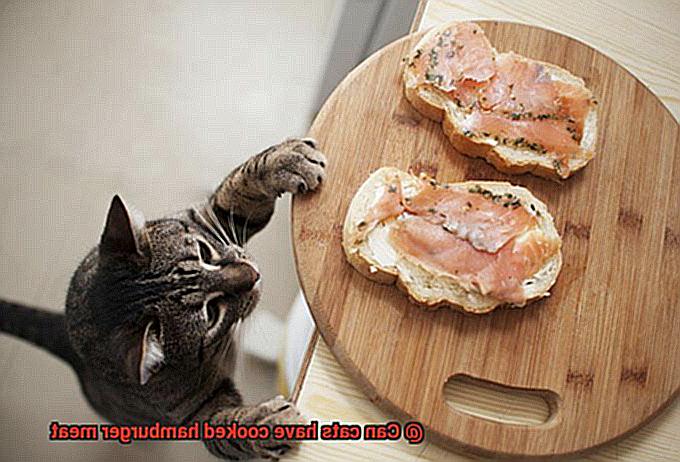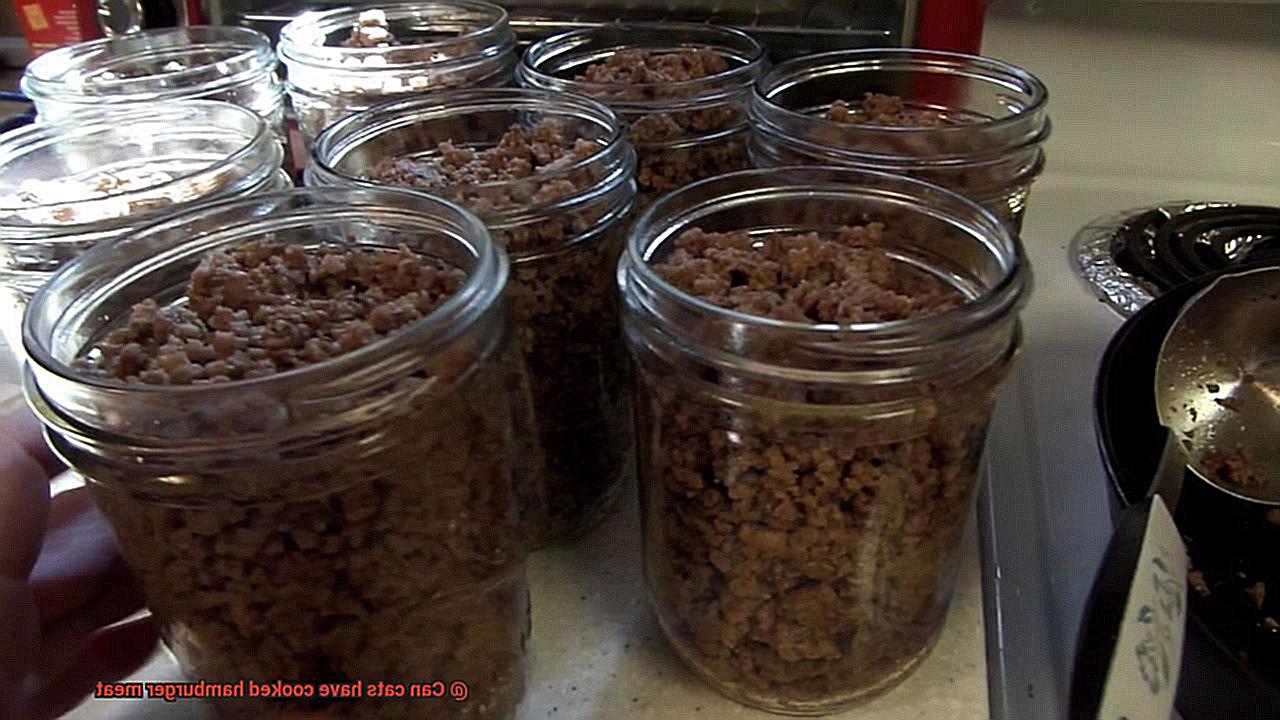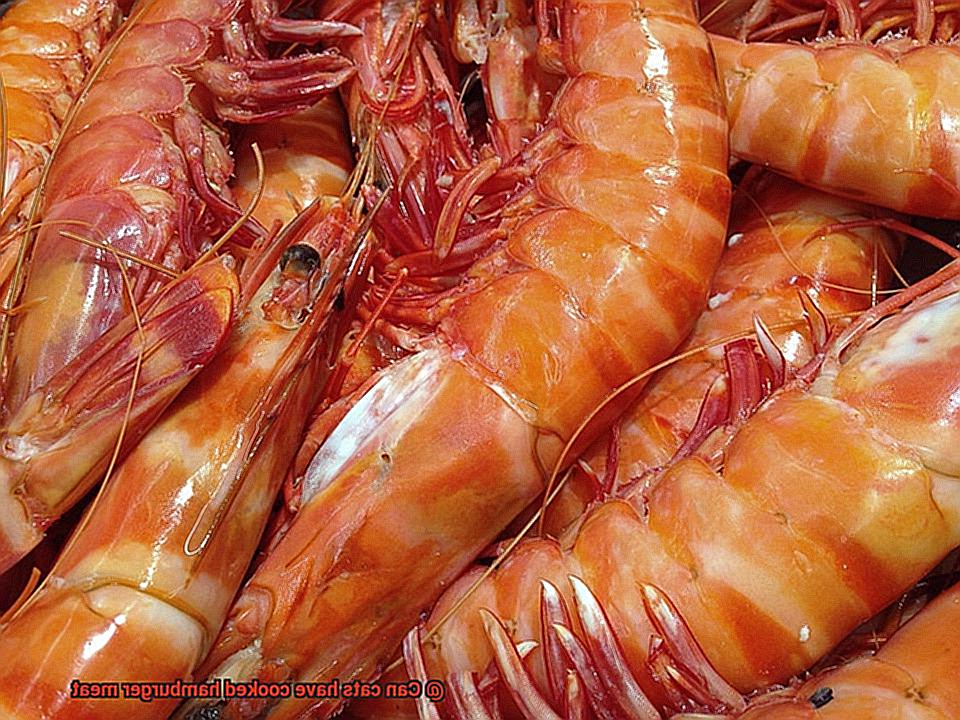Do you find yourself constantly indulging your furry feline with scrumptious treats? Are you guilty of sneaking some of your favorite human foods to your cat, especially cooked hamburger meat? As a cat lover, it’s natural to want to treat your pet like royalty. However, before you go ahead and feed them that juicy burger patty, it’s essential to understand the potential risks involved.
While cats are obligate carnivores and require a protein-rich diet, not all types of meat are safe for them. Cooked hamburger meat may seem like a quick and easy option, but it can pose hidden dangers that could harm your cat’s health in the long run.
In this blog post, we’ll explore the pros and cons of feeding your cat cooked hamburger meat. We’ll also answer some frequently asked questions such as how much is too much and the proper way to prepare the meat for your furry friend. So if you’re a doting cat owner who enjoys spoiling their pet with human food, read on to discover whether cooked hamburger meat is a safe choice for your feline companion.

What is Cooked Hamburger Meat?
Cooked hamburger meat is a mouth-watering treat that can be used in a variety of dishes like burgers, meatloaf, spaghetti sauce, and chili. But what exactly is it? Cooked hamburger meat is ground beef that has been cooked to a safe internal temperature of 160°F (71°C) to eliminate any potential harmful bacteria such as E. coli or Salmonella that may be present.
If you’re a cat owner, you’re probably curious about whether or not it’s safe to feed your feline friend some cooked hamburger meat. The good news is that it’s generally safe for cats to eat cooked hamburger meat in moderation. But before you start feeding your cat this delicious treat, there are some important things to keep in mind.
Firstly, it’s critical to ensure that the meat is plain and free from any added spices or seasonings that could be harmful to your cat. Additionally, the meat should be fully cooked and heated to a safe internal temperature of 160°F (71°C) to safeguard against any harmful bacteria such as E. coli or Salmonella that may be present.
While hamburger meat can be an excellent source of protein for cats, it should not make up a significant portion of their diet. Cats require a well-balanced diet that includes other nutrients such as taurine, which is crucial for their heart and eye health. It’s also important to note that cooked hamburger meat should not be fed to cats regularly as it may lead to obesity and other health issues.
When introducing new foods to your cat’s diet, it’s best to do so slowly and monitor their reactions. Some cats may have allergies or sensitivities to beef, so it’s essential to keep an eye out for any signs of an adverse reaction.
Is Cooked Hamburger Meat Safe for Cats?
While it is generally safe in small quantities, there are some crucial considerations to keep in mind.

First and foremost, it’s important to note that cooked hamburger meat should not be the sole source of your cat’s nutrition. While it does provide essential protein, it lacks other vital nutrients that cats need to thrive. A balanced diet with high-quality cat food is necessary for optimal health.
However, when given in moderation, cooked hamburger meat can be a tasty treat for your feline friend. It’s important to ensure that the meat is plain and fully cooked, without any harmful seasonings or additives. Onions and garlic are highly toxic to cats and must be avoided.
Cooking the meat also eliminates the risk of bacterial infections such as salmonella and E.coli, making it safe for your cat to consume. However, proper food handling and storage practices must be followed to prevent any contamination.
Feeding your cat too much cooked hamburger meat can lead to obesity and other health issues. It’s best to mix small amounts into their regular food or offer it as an occasional snack.
Bacterial Contamination Concerns with Feeding Cooked Hamburger Meat to Cats
When it comes to feeding cooked hamburger meat to our cats, there are valid concerns about bacterial contamination.
Raw meat can harbor harmful bacteria such as Salmonella and E. coli, which can cause serious health problems for our cats if not cooked thoroughly or stored correctly. While cooking the meat can kill these bacteria, it’s essential to ensure that it has been cooked all the way through and stored in airtight containers to avoid any potential contamination.
Moreover, cats have a different digestive system compared to humans and are more susceptible to certain types of bacteria. Even if the meat appears fully cooked, there may still be a risk of bacterial contamination that could make your cat sick.

Aside from bacterial contamination concerns, some cats may be allergic or sensitive to certain ingredients in hamburger meat, such as onions or garlic. These ingredients can cause digestive issues or even toxicity in extreme cases.
To ensure your furry friend’s health and safety, it’s always best to consult with a veterinarian about your cat’s specific dietary needs. While cooked hamburger meat can be a source of protein for cats, it’s crucial to weigh the potential risks and take necessary precautions.
Here are some tips to consider:

- Only give your cat cooked hamburger meat that has been cooked thoroughly and stored properly.
- Commercially prepared cat food is formulated for their dietary needs and is the safest option.
- Always check with your veterinarian before introducing any new foods into your cat’s diet.
- Be aware of any allergies or sensitivities your cat may have to specific ingredients.
Fat Content Considerations When Feeding Cats Cooked Hamburger Meat

It’s crucial to consider the fat content of the meat before feeding it to your feline friend. While cats require some fat in their diet, consuming too much can lead to health issues such as obesity and pancreatitis.
To ensure that your cat stays healthy, consider the following fat content considerations when feeding them cooked hamburger meat:
- Opt for lean cuts: The fat content of ground beef can vary widely depending on the type of beef and how it was processed. When choosing hamburger meat to feed your cat, opt for lean cuts with a lower fat content. Ground sirloin is an excellent choice as it typically has a lower fat content than ground chuck.
- Avoid added fats and seasonings: Cooked hamburger meat often contains added fats such as oils or butter, which can further increase the fat content. Avoid seasoning the meat with spices or salt as these can also be harmful to cats.
- Feed in moderation: While it’s tempting to treat your cat with cooked hamburger meat, remember that it should only make up a small portion of their overall diet. Feeding too much can lead to health issues, so be sure to monitor the amount you give them.
- Ensure a balanced diet: It’s essential to ensure that your cat is receiving a balanced and complete diet that meets all of their nutritional needs. Talk to your veterinarian about the best way to incorporate cooked hamburger meat into your cat’s diet and any potential risks or concerns.

Nutritional Balance and Variety of Protein Sources for Cats
A balanced diet that includes a variety of protein sources is essential to keep your cat healthy and happy. However, it’s crucial to know that not all protein sources are created equal, and some options may have adverse effects on your cat’s health.
One food that may come to mind is cooked hamburger meat. While it may seem like a convenient and tasty option, it’s not recommended for cats. As obligate carnivores, cats require a protein-rich diet to thrive. However, cooked hamburger meat doesn’t contain the specific amino acids, vitamins, and minerals that cats need in their diet. Without these essential nutrients, your feline friend may suffer from deficiencies and health problems.
Moreover, cooked hamburger meat can contain harmful chemicals, preservatives or seasonings that can upset your cat’s digestive system and cause vomiting or diarrhea. It’s crucial to cook meat thoroughly to ensure it’s free of any bacterial contamination that could make your cat sick.
If you prefer feeding your cat homemade food, it’s essential to consult with a veterinarian or veterinary nutritionist to ensure that the diet meets their nutritional needs. They can provide guidance on the appropriate balance of protein sources and other essential nutrients.
That being said, the best option for your cat’s nutritional balance and variety of protein sources is a commercial cat food. These foods have been formulated specifically for cats and have undergone rigorous testing to ensure their safety. They provide all the necessary nutrients cats need in their diet in the right proportions.
When choosing commercial cat food, it’s crucial to read labels carefully and pick products with high-quality ingredients. Aim for foods with named animal proteins (e.g., chicken or fish) as the primary ingredient rather than by-products or fillers.

Tips for Feeding Your Cat Cooked Hamburger Meat
Cooked hamburger meat can be a tasty and healthy treat for your cat, but it’s important to take certain precautions to ensure your cat’s safety and health. Here are some tips for feeding your cat cooked hamburger meat safely and healthily:
Choose Lean Cuts of Meat
When selecting cooked hamburger meat for your cat, it’s important to choose lean cuts without any added seasoning or spices. High-fat ground beef or meat with added ingredients like onions and garlic can cause digestive issues and even make your cat sick. Lean cuts like sirloin or ground turkey are good options.
Cook the Meat Thoroughly
Cooking the meat thoroughly is essential to avoid harmful bacteria that could cause illness in your cat. Raw or undercooked hamburger meat can contain dangerous bacteria like Salmonella or E. coli, which can have serious consequences for both cats and humans. Cook the meat until it is brown all over, with no pink or red areas.
Feed in Moderation
While cooked hamburger meat can be a healthy source of protein for your cat, feeding too much meat can lead to weight gain and other health issues. It’s best to give small amounts of cooked hamburger meat as an occasional treat rather than a regular part of your cat’s diet. Variety is also important – supplement cooked hamburger meat with other types of protein like chicken or fish.
Consider Dietary Restrictions
Before feeding your cat cooked hamburger meat, it’s important to consider any dietary restrictions they may have. If your cat has a sensitive stomach or is prone to digestive issues, it may be best to avoid feeding them hamburger meat altogether. Consult with your veterinarian if you’re unsure about what foods are safe for your cat.
Consult with Your Veterinarian
If you’re unsure about feeding your cat cooked hamburger meat or any other human food, it’s always best to consult with your veterinarian. They can provide advice on the best types of food for your cat’s specific needs and may suggest alternative sources of protein that are safer and more appropriate for feline consumption.
Potential Health Risks of Feeding Cats Too Much Cooked Hamburger Meat
Before you indulge them with a delicious cooked hamburger meat, it’s vital to understand the potential health risks associated with feeding cats too much of it.

One major issue with cooked hamburger meat is its high fat and calorie content. While a small amount may not be harmful, regularly feeding your cat large amounts of cooked hamburger meat can lead to obesity and related health problems such as diabetes, joint issues, and heart disease. This is especially concerning for indoor cats who are less active than their outdoor counterparts.
Moreover, cooked hamburger meat lacks essential nutrients that cats require in their diet. Taurine, an essential vitamin for proper heart function and vision, is absent in cooked hamburger meat. A taurine-deficient diet can lead to blindness and heart disease in cats. Additionally, cooked hamburger meat does not provide the necessary amino acids that cats need for good health.
What’s more, feeding your cat too much cooked hamburger meat can result in bacterial contamination. Ground beef is susceptible to bacterial growth, particularly when not cooked at the right temperature or stored correctly. Feeding your cat contaminated meat can cause food poisoning and other gastrointestinal problems such as vomiting and diarrhea.
So what should you do? While a small amount of cooked hamburger meat may be acceptable as an occasional treat or supplement to their diet, it should be done in moderation and with caution. A well-balanced diet designed for cats that includes all the necessary nutrients is critical for their health. Too much cooked hamburger meat can lead to potential health risks such as obesity, nutritional deficiencies, and bacterial contamination.
Alternatives to Cooked Hamburger Meat for Cats
While cooked hamburger meat may seem like a tasty option to add to their meals, it shouldn’t be the only source of nutrition in their diet. Fortunately, there are plenty of safe and healthy alternatives that will satisfy your cat’s taste buds and keep them healthy and happy.
Firstly, cooked chicken is a superb alternative to cooked hamburger meat. It’s rich in lean protein and easy for cats to digest. You can boil or bake chicken breast and shred it into small pieces for your cat to relish. Canned tuna or salmon is another excellent option as they contain high levels of protein and omega-3 fatty acids that are vital for your cat’s coat and skin health.
For feline vegetarians out there, cooked vegetables such as carrots, green beans, and sweet potatoes are packed with essential vitamins and minerals that can keep your cat healthy. Steam or boil them until they are soft enough to make them easier for your cat to consume, then chop them into small pieces.
If you’re looking for a more adventurous alternative for your cat’s diet, frozen raw food is a great option. Many companies offer pre-made frozen raw food meals formulated specifically for cats that contain a blend of meat, organs, bone, fruits, and vegetables for added nutrition.
uQFa3t1onlg” >
Conclusion
In conclusion, cooked hamburger meat can be a delicious treat for your feline friend, but it should only be given with caution and in moderation. It’s vital to ensure that the meat is plain, fully cooked, and stored correctly to avoid any bacterial contamination that could harm your cat’s health.
However, cooked hamburger meat lacks essential nutrients that cats need to thrive. Therefore, it shouldn’t make up a significant portion of their diet. Overfeeding your cat with cooked hamburger meat can lead to obesity and related conditions, which can be detrimental to their overall health.
When introducing new foods into your cat’s diet, it’s best to proceed slowly and keep an eye on their reactions. Some cats may have allergies or sensitivities to beef or other ingredients. It’s crucial to consult with a veterinarian about your cat’s specific dietary needs before introducing any new foods into their diet.
While there are potential risks associated with feeding cats cooked hamburger meat, there are plenty of safe and healthy alternatives available. Cooked chicken, canned tuna or salmon, and cooked vegetables are all excellent options that provide the necessary nutrients for your cat’s health.
For those looking for a more adventurous option, pre-made frozen raw food meals formulated specifically for cats are also a great alternative. These meals provide all the necessary nutrients while satisfying your cat’s taste buds.

